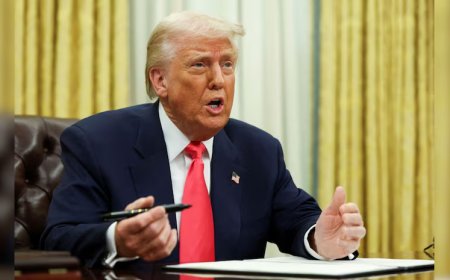Trump's travel ban takes effect, blocking entry for citizens of 12 countries into the US
Trump's travel ban takes effect, blocking entry for citizens of 12 countries into the US.

President Donald Trump's expansive new travel ban came into effect just after midnight on Monday, barring entry to the United States for citizens from 12 countries and reviving a controversial policy from his first term.
The move is expected to disrupt refugee resettlement and further tighten immigration rules as the administration intensifies its efforts to combat illegal immigration.
The list of countries affected includes several with strained relations with the U.S., such as Iran and Afghanistan, as well as others grappling with instability, including Haiti and Libya.
Trump cited a recent attack in Colorado targeting Jewish protesters—allegedly carried out by a man who had overstayed his visa—as the immediate trigger for the policy, arguing it highlighted the dangers of admitting foreign nationals without thorough vetting.
According to the White House, the ban blocks all travel from the following countries: Afghanistan, Myanmar, Chad, Congo-Brazzaville, Equatorial Guinea, Eritrea, Haiti, Iran, Libya, Somalia, Sudan, and Yemen.
In addition, partial travel restrictions have been placed on Burundi, Cuba, Laos, Sierra Leone, Togo, Turkmenistan, and Venezuela. Nationals from these countries may still be eligible for certain temporary work visas.
Trump warned that more nations could be added to the list “as new threats emerge globally.”
Mehria, a 23-year-old Afghan refugee applicant, said the policy has left her and others in limbo. “We gave up everything for a promise from America,” she told AFP. “Now we’re living one nightmare after another.”
Exemptions apply for athletes participating in the 2026 World Cup and the 2028 Los Angeles Olympics, as well as for diplomats from the affected countries.
UN human rights chief Volker Türk expressed concern over the sweeping nature of the ban, suggesting it may breach international legal standards.
Democratic lawmakers condemned the order, calling it discriminatory and unconstitutional. Iranian-American Congresswoman Yassamin Ansari wrote on X, “I know the pain caused by Trump’s cruel and xenophobic bans. We will fight this with everything we have.”
Speculation about a renewed travel ban had intensified after the Colorado incident, with the Trump administration pledging a crackdown on individuals in the U.S. on expired visas.
Authorities identified the suspect, Mohamed Sabry Soliman, as an Egyptian national who had overstayed his tourist visa and later applied for asylum in 2022. Notably, Egypt is not on the new travel ban list.
The administration justified including some countries—such as Afghanistan, Libya, Sudan, Somalia, and Yemen—by citing a lack of functioning governments capable of issuing and verifying travel documents. Iran was labeled a state sponsor of terrorism, while other countries were flagged for high rates of visa overstays.
What's Your Reaction?






















































































